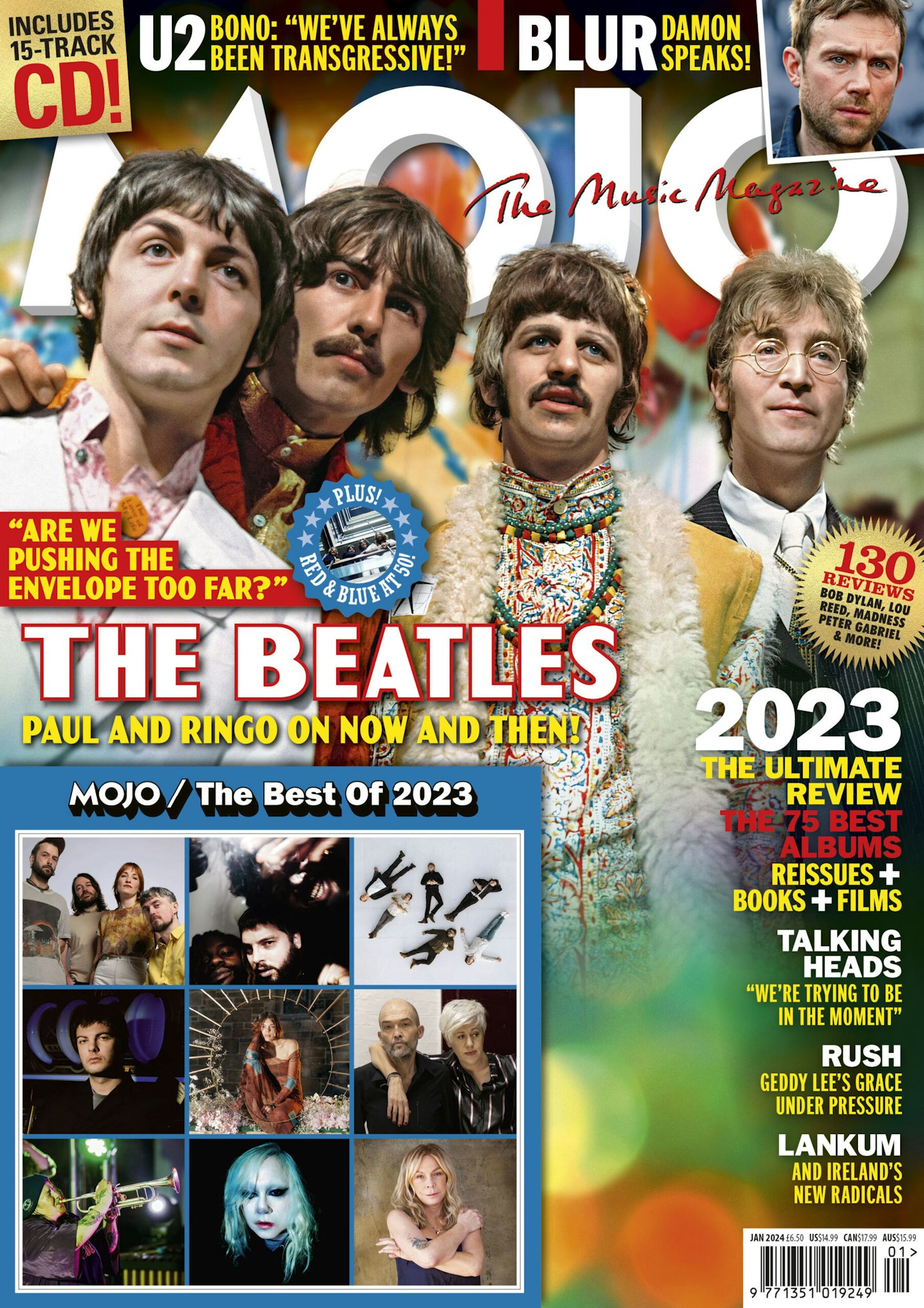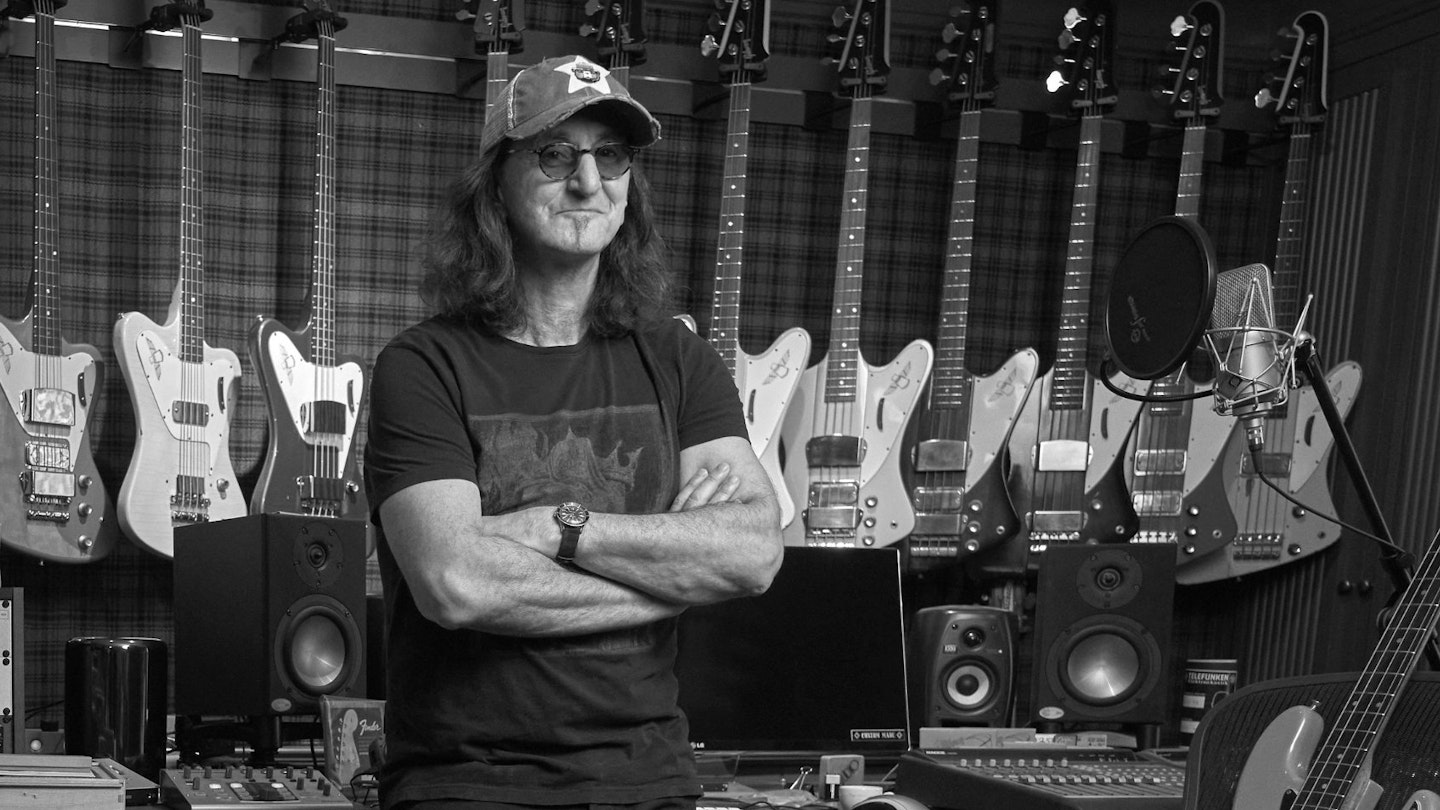Portrait: Richard Sibbald
As the bass, and high tenor, of Canadian prog rock gods Rush, Geddy Lee has navigated a life and career filled with both tragedy and comedy. In this extract from our exclusive interview with Lee in the latest issue of MOJO, he talks to James McNair about the early days of Rush, the controversy surrounding their iconic third album 2112, on the road excess and why he decided to quit drugs…
Rush’s self-titled 1974 debut was heavily influenced by Led Zeppelin. You saw them in Canada as a kid, right?
It was life-changing. [Rush’s first drummer] John Rutsey had seen them on their very first trip to Toronto at this little club called the Rockpile. As soon as the first Zeppelin LP dropped we all bought it and thought, What is this? It had a kinda Humble Pie vibe, but it was broader and the brushstrokes were bolder. We were in ecstasy, jabbering about them non-stop. That fall they came back to Toronto and John, Alex and myself sat in the second row. I didn’t think they were beings who walked – they floated onto the stage like gods.
From the outset, you and John Rutsey wanted different things?
John was a real rocker. Into glam and the glam image, and a drummer in the spirit of [Free’s] Simon Kirke. Alex and I soon realised our musical differences with John could not be overcome, plus John had legitimate health fears related to his diabetes and it was clear that touring America wasn’t on the cards for him. We were hungry to expand our sound, and he was not. So when Neil walked in to audition that day and blew us away, we knew we had found our fellow traveller.
All three of you were virtuosos…
Alex was always incredibly talented and spontaneously creative. Those big fat Serbian fingers of his meant his guitar strings didn’t stand a chance! And they gave him a tone which was not like that of his heroes. Then Neil came in and had a catalytic effect on our creative corpuscles. Neil lifted me up as a bass player. I’d like to think I pushed him too.
Yet your third LP, Caress Of Steel, bombed. In your book you tell of playing it to Kiss’s Paul Stanley and “the guy who sang Strutter every night” looking perplexed.
Right (laughs). I can’t look at Caress Of Steel as successful, but we had to try a concept record sooner or later. When you’re contracted to release two albums a year, you record what you write. And as naive as parts of that record were, some of it is kinda cool and some of it is kinda funny.
Then came 1976’s 2112, the record where you defined your early sound.
Our confidence had been shaken by the response to Caress Of Steel, but we knew we wanted to make a great record or die trying. We didn’t recognise 2112 as a quantum leap forward when we were making it, though. We didn’t have the objectivity to see why it succeeded and Caress… failed. But clearly, 2112 was more passionate and cohesive, and had better songs. Career-wise, it saved our bacon.
In 1978, a snarky NME piece by Barry Miles accused Rush – and Neil in particular – of “proto fascism”, and pilloried Neil’s admiration for Russian-American writer, Ayn Rand.
It’s amazing how long that mud stuck. Part of the way we used Rand’s inspiration was defiantly anti-totalitarianism, as played out in the sci-fi plot of 2112. And, fairly obviously, we were never fascists. Thatcherism was rising in Britain. The left were understandably freaked out, and I didn’t blame [Miles] for having the belief system he had. But to suggest that 2112 was suckering kids into a right-wing mantra with fascistic overtones was wrong-headed and irresponsible.
How did your hard rock peers view Rush? As eccentrics?
They didn’t necessarily like our music, but we always got technical respect, even if they weren’t going to buy our records and study them. Musically, we were more of an influence on the generation that came after us. Bands like Primus, and the whole Seattle grunge scene. With very few exceptions, we got on well with bands we toured with, especially if they liked a drink. Nazareth drunk us under the table, though!
The received wisdom about Rush was that they weren’t druggy. But you dropped purple Owsley microdots in 1969 and got into cocaine in the ’80s and ’90s. How come we didn’t know?
Well it wasn’t like Zeppelin. People weren’t writing about what happened on the tour bus, so that saved us from prying eyes. We could fuck ourselves up in private.
In your new book, My Effin’ Life, you explain why you quit cocaine.
Well, firstly, our touring schedule in those years was insane. We once did 23 one-nighters in a row, all in different cities. Our youthful energy was finite and at some point the cocaine was actually useful. And fun. My buddies would meet me stage-left during the drum solo and we’d do some lines. Then there was a night in Texas where a buddy and I were trying to score coke, and, terribly, we used some fans to acquire some. I couldn’t look at myself in the mirror the next day. I could hear my mother’s voice: “Nice Jewish boys don’t drink beer.” Nice Jewish boys don’t exploit their fans to score coke, either.
My Effin' Life is out now via Harper Collins. Geddy Lee tours the UK this December. More info and tickets HERE.
“When Neil told Alex and I about his brain cancer, we couldn’t cope…” Read the full interview only in the latest issue of MOJO, on sale now. Order a copy HERE.

